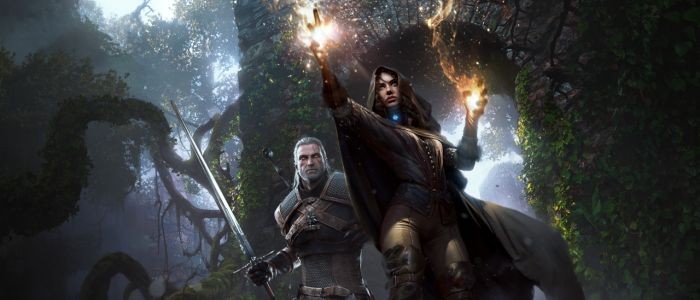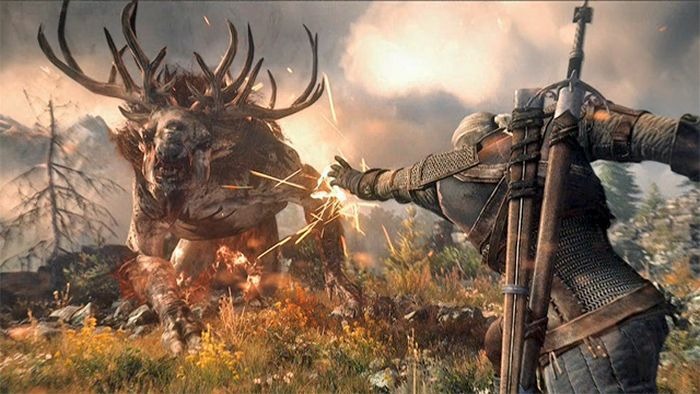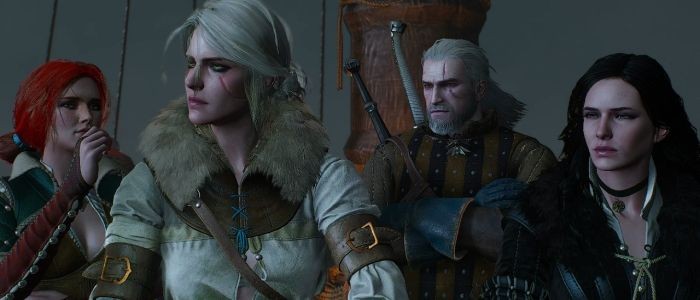'The Witcher' Netflix Series Primer: What You Need To Know About Geralt Being Adapted (Again)
Netflix has announced that they're adapting The Witcher into a new series and gamers around the world rejoiced.
But The Witcher was a series of fantasy books written by Andrzej Sapkowskit long before it was a game! With five novels and two short story collections (none of which, humorously, are called The Witcher) set in this world of monsters and monster hunters, there is a ton of material to mine for a TV series.
Here's a rundown on what you can expect (and what we hope to see).
The Basics
The main thrust of the books concerns the titular character, also known as Geralt of Rivia. Witchers are basically mutants, people who have been taken away as children and forced to suffer various poisons and elixirs to strengthen them and make them best at what they do – kill monsters. They always work for money and business is booming. There are plenty of people around the world who have monster problems and a Witcher carries both iron and silver swords in order to deal with either human and non-human foes.
Part of the series' success is that it updates fairy tales (and Polish ones perhaps unfamiliar to American audiences) in a mature way. By mature, I mean that it deals with heavy themes such as politics, child abuse, infidelity, and even civil rights issues. That's not to say it doesn't feature sex and bloodshed (because it has plenty of that), but on a whole, it's a thoroughly adult story.
Geralt is joined by a deep cast of characters, including his longtime friend Dandelion, a bard with a knack for getting into trouble; his "soul mate" Yennefer, a powerful sorceress; and their adopted daughter Ciri, who is a Witcher in training.
Previously, on The Witcher
This isn't the first time Geralt and crew have been adapted for the screen.
In 2001, the story was turned into a Polish film called Wiedzmin, aka The Hexer, which is Sapkowski's preferred translation. It was almost universally panned. Part of the reason it was so poorly received is that it was actually a 13-episode TV series condensed into a single two-hour film. You can catch a glimpse of its quality (or lack thereof) with the trailer above.
The full TV series was eventually released the following year, but its reputation had already been tainted by the film's terrible reception, and it too was considered a failure.
The Best Adaptation
Fortunately, a superior adaptation was on the way, courtesy of relatively unknown development company CD Projekt RED. The company may be an acclaimed studio nowadays, but it started small-time by localizing and importing PC games into their native Poland, a place no one believed could support a game market. They proved the world horribly wrong with that and then set out to create their own games, even though they knew little about game development.
They learned on the job, and you can see them improving their craft with each successive Witcher title, finally crafting a game (2015's The Witcher 3: Wild Hunt) that solidified them as one of the most exciting developers in the world.
The games are tremendous adaptations of the source material, with The Witcher 3 leaning heavily on the story of Ciri and how Geralt helps her to find a way in this world. But what's most remarkable is how nearly every interaction in the game seeks to reward player choice. Most of the time, there's no "right" way to do things, no blatant good or evil decisions to make. Even many of the monsters Geralt faces have their own lives, hopes, and desires, and you can choose to listen and find a better way than fighting your way through the game...although sometimes your words can cause even more pain.
Even though it's a tremendously deep and faithful adaptation, Andrzej Sapkowski made waves a few years ago when he seemed bitter about the games' success. At his book signings, fans started skewing younger and younger and he realized that most people coming to see him were familiar with the games, and he was mad to see his work rebranded with images from the video game. He continued to work with the developers, but he stated that his books made the games popular – a demonstrably false statement when you realize that the English translation of the first book (The Last Wish) hadn't even been released until the first Witcher video game adaptation hit shelves in 2007.
The wonderful graphic novels based directly on the the games probably didn't help things.
Regardless, now that the show is based more directly on his work, he can help them craft the show exactly as he hoped it would be, even if it is amusing that the series is still being titled The Witcher due to the game's success, and not The Hexer.
Real Live Monsters
One surprising note about this production is that it will be a live-action series. This is a fantasy world that requires all sorts of expensive makeup and monster effects. Geralt is great with a sword, but he can also cast magical spells at a whim and regularly chats with talking beasts. Surely this can't be cheap for a TV show.
That's why most people assumed that the adaptation would work better as an animated series. One need only look at production and visual effects company Platige Image's stunning work on the series, which is among the best ever seen. Don't believe me? Look at the opening scene that was created for the Assassins of Kings edition of The Witcher 2. It's better than most entire animated films!
They've gone on to create memorable cutscenes for For Honor, Hitman, and Total War: Warhammer, and, of course, The Witcher 3. If there's one good thing to note, it's that Platige is actually the same company that will be doing the effects for the show. It will just be interesting to see how all of this meshes together.
The Quen Sign
Still, effects only matter so much in a show like this. Similar to crossover successes like Game of Thrones or Battlestar Galactica, The Witcher's strength lies in its humanity. Without strong characters like Yennefer, Triss Merigold, and Dandelion to help drag out the human side of Geralt, the story is nothing.
But I'm not sure they should get into the Ciri story right off the bat. A whole season to set up Geralt's world and give you an idea of the difficult and thankless work he does would work wonderfully. The nature of the story would perfectly lend itself to monster-of-the-week episodes, with Geralt coming across some new problem to solve in each chapter. The show could take us back to his childhood and see all the horrific things he faced during his upbringing and give the viewers a good sense of what he is before moving him into the mentor position. Ciri's story works so well because she is the daughter Geralt will never have, but he's a difficult character to understand at first. If we spend some time with him and watch his unique way of dealing with conflicts and then see how that is contrasted by his decisions as a father figure... Well, that's what multiple seasons are for!



